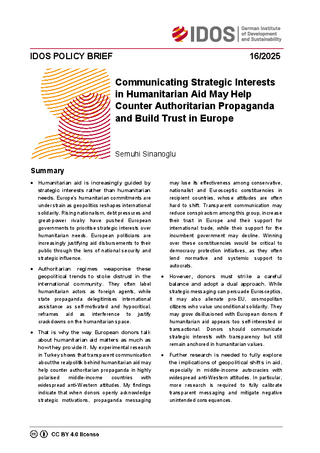Communicating strategic interests in humanitarian aid may help counter authoritarian propaganda and build trust in Europe
Sinanoglu, SemuhiPolicy Brief (16/2025)
Bonn: German Institute of Development and Sustainability (IDOS)
DOI: https://doi.org/10.23661/ipb16.2025
Humanitarian aid is increasingly guided by strategic interests rather than humanitarian needs. Europe’s humanitarian commitments are under strain as geopolitics reshapes international solidarity. Rising nationalism, debt pressures and great-power rivalry have pushed European governments to prioritise strategic interests over humanitarian needs. European politicians are increasingly justifying aid disbursements to their public through the lens of national security and strategic influence.
• Authoritarian regimes weaponise these geopolitical trends to stoke distrust in the international community. They often label humanitarian actors as foreign agents, while state propaganda delegitimises international assistance as self-motivated and hypocritical, reframes aid as interference to justify crackdowns on the humanitarian space.
• That is why the way European donors talk about humanitarian aid matters as much as how they provide it. My experimental research in Turkey shows that transparent communication about the realpolitik behind humanitarian aid may help counter authoritarian propaganda in highly polarised middle-income countries with widespread anti-Western attitudes. My findings indicate that when donors openly acknowledge strategic motivations, propaganda messaging
may lose its effectiveness among conservative, nationalist and Eurosceptic constituencies in recipient countries, whose attitudes are often hard to shift. Transparent communication may reduce conspiracism among this group, increase their trust in Europe and their support for international trade, while their support for the incumbent government may decline. Winning over these constituencies would be critical to democracy protection initiatives, as they often lend normative and systemic support to autocrats.
• However, donors must strike a careful balance and adopt a dual approach. While strategic messaging can persuade Eurosceptics, it may also alienate pro-EU, cosmopolitan citizens who value unconditional solidarity. They may grow disillusioned with European donors if humanitarian aid appears too self-interested or transactional. Donors should communicate strategic interests with transparency but still remain anchored in humanitarian values.
• Further research is needed to fully explore the implications of geopolitical shifts in aid, especially in middle-income autocracies with widespread anti-Western attitudes. In particular, more research is required to fully calibrate transparent messaging and mitigate negative unintended consequences.

